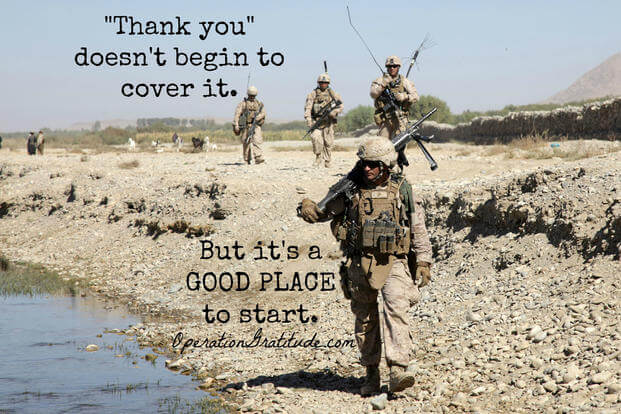Don't thank me -- the government thanks me twice a month. If you've served in the military, you've likely heard this phrase many times. And it's true.
We don't need to be thanked for our service to this country, but in the civilian world, these two words -- thank you -- hold the power to open doors, cultivate lasting professional relationships and land that dream job.
Saying Thank You Saved My Life
As for opening doors, it all started for me with a 3 x 5-inch thank-you card to author Maxine Hong Kingston.
After the loss of her home and a novel she had spent 10 years working on to the 1991 Oakland fires (this coincided with the death of her father), Kingston started a writing workshop for veterans to use mindful writing to work through issues of loss.
In 2003, I reached out to Kingston and thanked her for her tireless work with veterans. Shortly after, I received a thank-you card and an invitation to participate in the group, which met seasonally.
This was a turning point in my life. My PTSD-induced depression had me near suicide. Saying "thank you" literally saved my life, and since then, it has opened many doors and professional relationships. In addition, our writing group has published its work in the award-winning anthology, "Veterans of War, Veterans of Peace."
Gratitude = Respect
Sure, hustle and talent matter. But studies show people also want to like the people they work with, and expressing gratitude will go a long way in building respect.
According to a London School of Economics study, people put more effort in at the office when they were intrinsically motivated -- that is, if the work itself interested or excited them and, importantly, if they felt appreciated by their colleagues.
Gratitude Gives Us Meaning and Purpose
Janice Kaplan agrees. She is the author of "The Gratitude Diaries" and wrote in The Wall Street Journal: "We give our best effort if the work gets us interested and excited, if we feel that it's providing meaning and purpose, and if others appreciate what we're doing."
Much like with your boss, saying thank you to a peer should be reserved for when you really mean it and you have a solid, concrete thing to thank them for. And since peer-to-peer appreciation is less common, it, too, can be a great way to build trust and connections.
Saying thanks helps to show that person that you value them; returning the favor shows that you value investing in this relationship. It positions you as an ally and helps them to see you as someone who is "on their team" in the office.
Above all else, be authentic and specific with your gratitude. You don't want people to think you're trying to curry favor.
3 Ways to Say Thank You
1. Follow influencers who've made a difference in your life.
Reach out to them and say thank you. This includes your co-workers. Take time to notice and appreciate the little things; these small gestures make a difference.
2. If you're a job seeker, conducting informational interviews or actively interviewing for a job, take notes during (or immediately after) the interview.
If possible, write and send off a thank-you card to each person with whom you met, thanking them for their time. Be sure to include specific details from your conversation. This lets them know you pay attention to the details and care about their time and the attention they gave you. It puts your name back on top of the hundreds applying for that position.
3. If you're appreciative of a co-worker or your team, food treats are always welcome.
Bring in a variety of things (or specific, if for one person). Food is a great way to say thank you.
Find the Right Veteran Job
Whether you want to polish your resume, find veteran job fairs in your area or connect with employers looking to hire veterans, Military.com can help. Subscribe to Military.com to have job postings, guides and advice, and more delivered directly to your inbox.












